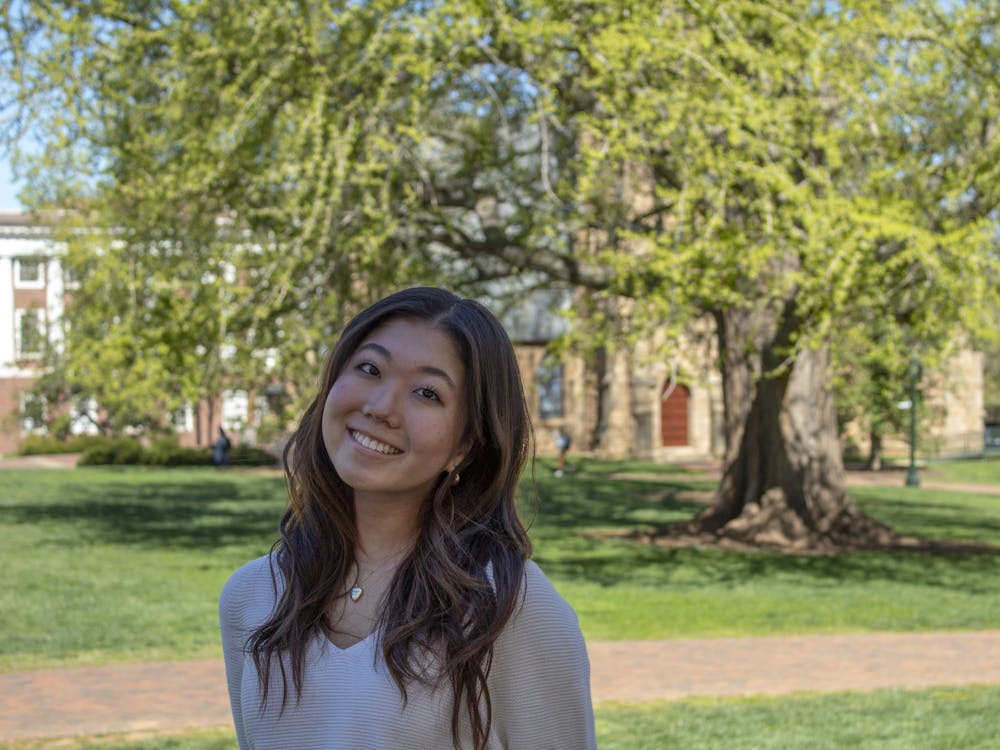For two years, there will be no television.
No newspapers, no magazines, no movies, no pop music, no parties, no e-mail, no going to bed past 10:30 p.m. and certainly no dating.
This 24-month period procession of prohibitions, which might sound like a grounding sentence for an unruly 15-year-old, actually turned out to be the most exhilarating time of several University students' lives.
This two year experience is something that young men active in the Mormon community are expected to do -- go on a religious mission.
Second-year Engineering student Kee Han, freshly returned from his mission, displays a persistently-wide smile. Han said he knew from an early age that he wanted to go on a mission, but he didn't know exactly when.
That is, until he came to the University.
"I came to U.Va. my first year and I thought about it a lot," Han said. "Something told me it was the right time."
Han subsequently ended up in Chicago the summer after his first year, riding a bicycle and wearing a suit with a Bible in his bag.
Two other missionaries, Graduate Engineering student Russ Reid and Graduate Arts and Sciences student Chad Shorter were sent abroad, to Brazil and Italy respectively.
Before embarking on their journey, each missionary must go through intensive training to study the Gospel and the language of the target country. Han, Reid and Shorter, like most missionaries from the United States, were trained in Provo, Utah.
When they say intensive, they're not kidding -- missionaries are trained for 10 to 11 hours per day, six days a week. The training period can last anywhere from three weeks like Han's, to two months, as was the case for Reid and Shorter.
Despite their heavy preparation, the former missionaries acknowledged the adjustments they had to make during the initial moments of their missions.
"At first, I couldn't understand Italians to save my life," said Shorter, who explained that he adapted quickly. "In the beginning I was like, 'Go, go go!' I was really excited."
Shorter also had an extra task at hand since he was sent to convert people in Italy.
"Everyone told me to go baptize the pope," he said, laughing.
Reid admitted that his adjustment was more gradual than Shorter's.
"It was a huge culture shock for me when I got there," Reid said.
After having flown all night, the novice missionary was set up with a more experienced "companion" and sent off to work immediately. Work meant walking out onto the street and speaking to strangers -- foreign-speaking strangers.
"I thought, 'I don't know how I'm going to do this for two years,'" Reid said. "And it was kind of like that for about two months. I didn't really like it."
But as time passed, Reid's first impression was stamped out completely.
"After I'd been there a few months I really enjoyed the lifestyle," he said.
Missionaries use two primary methods of approaching people: exposition, which is simply talking to people on the street, and tracting, which entails going door-to-door.
"It was weird at first to go up to someone and start talking about religion, but I got used to it," Han said. "People recognize the way you're dressed."
Even when conspicuously dressed in a suit and tie in 80-degree weather, what does one say to a perfect stranger?
"We'd just be friendly at first," Shorter said.
Then, if the person was willing to listen, they would go on. The missionaries had a series of discussions, according to Reid, that outlined certain principles. If the person was interested, the missionaries would set up an appointment to discuss the religion in more detail. If, at that point, the person was still interested, they'd make another appointment. And some of those people would eventually convert.
Reid said he still keeps in touch with people he was responsible for baptizing, and said he places a special emphasis on those relationships.
"The friendship I have with them is a deep friendship," Reid said. "One lady who's been baptized changed dramatically -- we have an exceptionally strong bond."
Reid noted that the missionaries never imposed on other people.
"We weren't there to push if they didn't want to hear it," he said. "If we were going to talk to them, they'd have to invite us in."
Yet, being approached was imposition enough for some, according to Shorter.
"I learned there are jerks everywhere," he said. "Slamming doors, cussing me out."
But Reid said those negative reactions were "exceptions." In fact, both Reid and Shorter said they were taken aback by the overwhelming enthusiasm of the people they encountered, even those who weren't at all interested in converting.
As the missionaries went about their door-to-door rounds, they would often be invited in for dinner. Reid laughed about his common feast of chicken livers, compared with Shorter's good fortune to be fed Italian food.
Some hosts were generous with more than mere nourishment.
"Once I was at somebody's house and I said to this kid, 'Hey Filipo, I like your belt,'" Shorter said. "And his grandma was like, 'Give it to him! Give it to him!'"
Reid grinned, recalling an analogous situation. "I said to one family, 'I like these wood carvings,' and they were like, 'Oh, you can have them,'" he said.
Missionaries follow a strict schedule. They wake up at 6:30 a.m. every day, including weekends, and for the next three hours they study the scriptures -- the Bible and the Book of Mormon -- squeezing in breakfast and a shower. They also use the morning to plan the rest of the day. Then, from 9:30 a.m. until 9:30 p.m., they devote all of their time to talking to people, trying to seek out converts. Bedtime is at 10:30 p.m.
Their only semblance of a break is the couple of hours per week when they take care of business such as laundry and groceries.
Finally, aside from the restrictions on television, dating, etc., they are not permitted to communicate with anyone they knew prior to the mission. Exceptions include Christmas and Mother's Day, when the missionaries are allowed to call their families.
The students admitted that observing the rules and the schedule was no easy task. But they recognized that only by maintaining this rigid lifestyle could they focus entirely on their work, spiritually and physically. Besides, Shorter pointed out, every missionary is ultimately free to do what he wants.
And it's usually not a problem, because missionaries tend to follow the rules willingly. Even when he went into another person's house and the television was turned on, Han said, he kept from looking at it.
"If I had a TV [during my mission], I'd be completely off-track," Han said, glancing up at a television broadcasting a sitcom as he finished his sentence.
Han also stressed that a sense of accomplishment comes from discipline and exertion.
"It was sometimes exhausting," he said. "But it's like working out -- it's a great feeling if you're sore because you know you've given your best."
At the end of the experience, the students said they were sorry to go.
"The end for me was a real emotional rollercoaster," Shorter said. "I was so happy to see my family and to go back home. But then when I had my meeting with my local leader, I was just crying my eyes out. I started to realize then what I was leaving behind."
Reid said he dealt with the same emotions.
"A huge part of my life was going to be gone -- I was never going to see these people again," he said.
After all of the goodbyes, the students said the hellos were a welcome change. But when the thrill of return had worn off, readjusting was hard.
"It almost felt like I'd never been gone," Shorter said. "When I first came back, everyone was all excited, but then they had to go to work. It was kind of like being Tom Hanks in 'Castaway.'"
Shorter added that it was difficult even to return to the luxuries of life, those privileges he had ascetically avoided for two years.
"It was hard to get into the swing of things, especially girls," he said, and Reid nodded knowingly.
Shorter described the return as almost eerie; after only three days, he said he believed he had crossed vast expanses of time. To make matters worse, it was summer, and he had little to do but work.
So, chiefly out of boredom, Shorter went back to school, started studying Italian, and that was when he realized his mission had affected his life more than just spiritually and emotionally. It had led indirectly to his career decision: teaching Italian.
Besides, Shorter said, he knew he had to take care of other business now.
"Your concentration shifts," he said. "As a missionary, your focus is other people. When you get home you need to get your own life in order."
Han said the most difficult part for him was coming back to school this fall. A peculiar element of his return was that all of his first-year peers were now fourth years, and he's still a second year.
But after one semester back at the University, Han said he's now fully adjusted, and things are even better than before.
"Everything flows smoother now," he said.
Reid agreed that his mission had profoundly influenced him. "Those two years were one of the defining moments of my life," he said.




